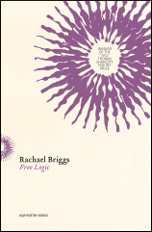
Free Logic by Rachael Briggs
UQP, 2013
Winner of the 2012 Thomas Shapcott Prize, Free Logic is the debut collection from poet and philosopher Rachael Briggs. The book is divided into nine sections, each poetically exploring themes of love, identity, and sexuality. Briggs infuses her poetic explorations with surreal allegories, moments of metamorphosis and a constant teasing of the ‘logical’, which allow for her poetry to forge an opening towards new possibilities. Briggs strikingly connects insightful fantasies with philosophical considerations.
As the title and Briggs’ occupation suggest, the poetry in Free Logic participates in a dialectical exploration of philosophical ideas yet her poetry is predominately written in everyday diction. The book combines both American and Australian idioms and slang to draw attention to the complex ways in which language contributes to the formation and reformation of identity. Briggs is especially interested in the reformation of identity, with sections such as ‘Cryptid Riddles’ and ‘This Poem Is Not About You’ devoted to exposing how urban mythologies and popular culture feeds into the understanding of our existence. The poem ‘Confessional’ opens with:
On daytime TV, there’s a woman trapped in a man’s body. Who is this man? How can she give him back his body?
Briggs’ play with literalism creates not only a darkly comical effect but also an exposure of the ways in which popular culture continually encourages a superficial representation of gender identities. ‘Confessional’ continues:
When my ex came out of the closet, she lost her moustache and glasses. The trench coat fell from her body. The incredible human mind! It leaps a cathedral, soars over a sonata—and stumbles on the hillocks of the body. I love my voice, which sings out to other women. Is that enough? Or must I also love my body?
The poem explores the mind-body dualism – the couplet form allowing for this tension to be displayed formally, the repetition of the word ‘body’ at the end of each stanza emphasising the ways in which constant attention is always focused on ‘the body’. The poem ends with the rejection of the gendered dichotomies that are still endorsed with gendered names:
Forget Rachael. I’d rather be Rae, or Ray: a brass flourish that could announce anybody.
The wordplay of ‘anybody’ reinforces the possibilities of identity that these poems encourage, as a reader of these poems we can be ‘any body’ and/or ‘anybody’.
The stunning inventiveness of Briggs’ poetry does not occur within an expected free verse, but with a return to metrics and rhyme. She devotes particular attention to the sonnet, recurring throughout the collection, but appear most notably in the ‘Toothfish’ and ‘Tough Luck’ sequences. ‘Tough Luck’, winner of the 2011 Val Vallis Award for Unpublished Poetry, tells of a narrator’s pursuits of unrequited love and gender identity. Written in the tradition of the Petrarchan love sonnet, ‘Tough Luck’ is also an example of a sonnet corona or crown of sonnets whereby the last line of each sonnet forms the first line of the subsequent sonnet and ending with the first line of the sequence to complete the crown. Direct reference to this form is provided by the title of the opening sonnet ‘King for an Evening’, the entire sonnet needs to be quoted in full to demonstrate Briggs’ ingenious enjambments:
You think that I’m good-looking for a girl; I’ll take it over ‘competent’ or ‘smart’. (I nick my upper lip. That’s going to smart when I apply the spirit gum.) A girl had better take what she can get. (I twist the bandages around my chest—too tight— can’t breathe—unwrap and start again.) The tight- rope thrill of you’s enough. I guess the twist (and twist and fasten) is the way my body is less ‘jewelled evening gown’ than ‘undershirt’. No wonder you don’t want it. (Undershirt then button-up, then tie.) Would anybody? (A dab of Old Spice. Hair gel, comb, slick back. I check the mirror. Half a man looks back.)
By repeating the words for the sake of an end rhyme, which is what occurs throughout the entire sequence, Briggs alludes to the constructed and performative aspects of gender. By restricting the narrative sequence within the sonnet form, Briggs is able to poetically demonstrate the social conventions that we must negotiate in order to create alternative expressions of gender and identity.
Briggs allows her words to peel back scales of convention and her allegorical poems, ‘The Care and Feeding of Prehistoric Reptiles’ and ‘Minnow’, reveal just what language can do. Briggs’ use of the allegory invites the reader to imaginatively interact with symbolism in order to excavate meaning. Briggs leaves the reader with the poem, ‘Third Gender Roles’. The positioning of this poem at the end of the collection ensures a continuation of possibility established by the preceding poems:
I’m sick of being the girl. How bout I be the flugel horn, or the popcorn-maker, or the giraffe?









